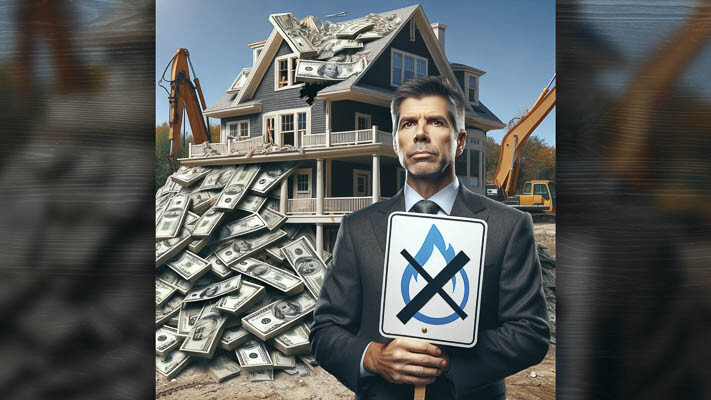
The new version adopted by the SBCC seeks to achieve the same goal without violating federal law
Todd Myers
Washington Policy Center
Washington’s State Building Code Council (SBCC) has once again adopted rules designed to eliminate natural gas energy for new residential and commercial construction. The original proposal was modified when a similar regulation adopted by the city of Berkeley, California was overturned by the U.S. Ninth Circuit Court of Appeals. The new version adopted by the SBCC seeks to achieve the same goal without violating federal law.

Like the previous version, the new rules were pushed through the process without providing adequate information about the costs of the new regulations.
For example, the Preliminary Cost Benefit Analysis for the changes in the energy code is required to demonstrate that “that the rule being adopted is the least burdensome alternative for those required to comply with it that will achieve the general goals and specific objectives stated.”
Instead of considering the burden, the proponents simply claim that “There are no alternatives to this procedure. If the rule is not adopted, there may be a violation of federal law. If this code were amended to be less stringent, it would be a violation of the State Law, RCW 19.27A.045, which will affect the promotion of energy efficiency and safety in buildings consistent with accepted standards.”
There are, of course, many ways to meet the goals of the law. The proponents’ own language demonstrates this. They claim that there “may” be a violation of federal law but are unsure. The cited RCW only requires that “increase the energy efficiency of newly constructed residential buildings.” The proponents’ claim that any alternative would be “less stringent” is incorrect. There are alternatives that would achieve the goal of increased efficiency at lower cost. The obligation of the agency is to provide evidence that they considered alternatives, not to glibly claim there are no other possible options.
For example, RCW 19.27A.160 (2) makes it clear that “If the council determines that economic, technological, or process factors would significantly impede adoption of or compliance with this subsection, the council may defer the implementation of the proposed energy code update and shall report its findings to the legislature by December 31st of the year prior to the year in which those codes would otherwise be enacted.” The council could have deferred implementation.
That isn’t the only problem.
The Small Business Economic Impact Statement (SBEIS) included in the filing for the SBCC’s new residential and commercial energy code rules fail to completely provide the required information and violates the state’s requirements.
Under Washington’s Regulatory Fairness Act, agencies like the SBCC are required to complete an SBEIS, “If the proposed rule will impose more than minor costs on businesses in an industry.” The law requires that the SBEIS include several pieces of information, including an analysis of the cost of compliance, the impact on businesses’ revenue, and impact on jobs. The purpose is to provide decisionmakers with the information necessary to “reduce the costs imposed by the rule on small businesses.”
Nowhere in the SBEIS do the proponents calculate the impacts required in law. The statement does not provide evidence about “whether compliance with the rule will cause businesses to lose sales or revenue,” as required in RCW 19.85.040(1). It does not analyze the “costs of equipment, supplies, labor, professional services, and increased administrative costs.” There is no information about the “estimate of the number of jobs that will be created or lost as the result of compliance with the proposed rule,” as required in subsection (2)(d). Additionally, there is no comparison of the cost of compliance between small business and the largest business required to comply with the rules, using one of the following metrics: cost per employee, cost per hour of labor, or cost per one hundred dollars of sales.
These are not optional. The RCW says “A small business economic impact statement must include” these elements (emphasis added).
As a result of these shortcomings, WPC has filed an appeal to the State Building Code Council, asking them to repeal the rule due to these violations of the SBEIS requirements. They have 60 days to respond to our request.
This isn’t the first time the SBCC has failed to complete an adequate estimate of the costs of the rule. In the original proposal adopted in 2022, the analysis of costs and benefits relied on inaccurate information, with the final estimates showing the rules would increase housing prices but would not yield meaningful energy savings.
Adding insult to injury is that proponents attempt to justify the new codes, saying they will reduce CO2 emissions. The cost benefit analysis claims, “The legislative findings state that energy efficiency is the cheapest, quickest, and cleanest way to…confront climate change…” This may have been true in the past, but in 2023 the new requirements will have no impact on total state emissions. Washington has a declining cap on CO2 emissions that reduces the amount of natural gas and other CO2-emitting fuels that can be used in the state. Whether these rules are adopted or not, that cap will still be met. The rule increases housing prices but doesn’t provide environmental benefits.
At the very least, the State Building Code Council should comply with the law.
We will continue to update this as the SBCC considers our appeal of the SBEIS.
Todd Myers is the director of the Center for the Environment at the Washington Policy Center. Patrick Hanks contributed to this column.
Also read:
- Letter: ‘There will be consequences’Hazel Dell resident Bob Zak criticizes Democratic lawmakers for advancing ESSB 5181, arguing it undermines parental rights and defies biblical principles.
- Op-Ed: La Center Schools — Committed to families and their childrenIn a public letter, the La Center School Board and Superintendent Peter Rosenkranz affirm their commitment to supporting families and honoring both state law and community values amid state-level scrutiny.
- Letter: Mayor blames others on homelessness problem in Vancouver while she has enabled a lawless encampment zoneVancouver resident Peter Bracchi urges city leaders to enforce laws and end permissive policies that have allowed unsafe encampments to overrun public spaces near the Share House.
- Letter: ‘Look it up for yourself’Camas resident Anna Miller encourages skeptics of Elon Musk’s claims about government waste to do their own research using official resources.
- Opinion: Defending the indefensibleNancy Churchill argues that Washington’s lawsuit against a sheriff cooperating with ICE reveals a deeper political agenda that puts public safety at risk.











Let’s cut the BS, Co2 IS NOT THE problem! Natural gas appliances are super clean burning and more efficient than electric.
I know I was an appliance repairman for a number of years. Again Co2 is not the problem.
It is an odorless colorless necessary element in our atmosphere. It is NECESSARY for Photosynthesis.
Plant life absorb it and create oxygen, we breathe in oxygen and exhale CO2. Are we next?
The only dangerous Co2 is that emitted by #ClimateCommunism liars.
History: The Obama Biden era MANDATE that required the EPA to classify “Co2 a poisonous gas to be regulated” was not about the environment or cleaner air.
It was BHOs last ditch effort to thwart congress after his signature Cap an Trade bill was defeated by a majority vote in the house.
Fast forward to 2022. Jay Inslee followed the foot prints of the BHO Fundamental transformation of the UNITED STATES OF AMERICA, a war in oil, as a means to an end! Destroying American business and our economy. Dragging us down into a third world Marxist authoritarian rule.
This is war on truth and freedom. Denying known scientific FACTS. Obama is still front and center in this war on energy. Climate Change is a Hoax.